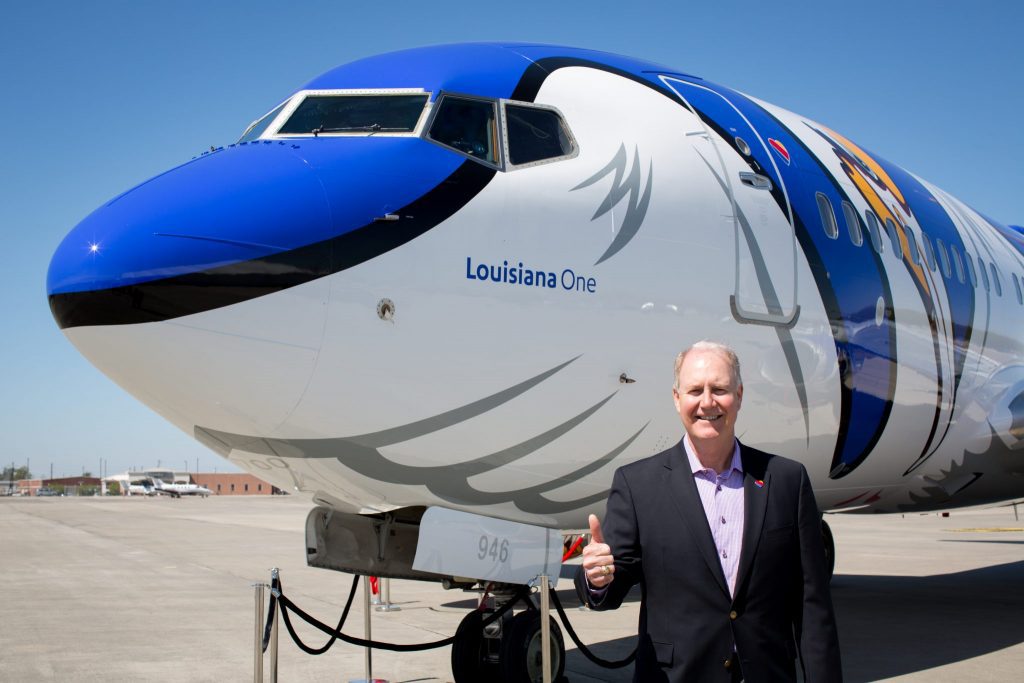Skift Take
Southwest has known for years that there is money to be made in differentiation and protecting your brand identity regardless of what Wall Street thinks. That's a factor in its decision not to launch basic economy or bag fees.
Southwest Airlines is still a maverick.
While the big three U.S. network airlines — Delta, United, and American — have introduced a no-frills Basic Economy product that generally comes with no seat selection or early boarding, and JetBlue plans to do so, Southwest CEO Gary Kelly flatly ruled it out.
In talking about two revenue-generating initiatives planned for 2020, which will be detailed later this year, Kelly also crushed any speculation and repeated that the airline will not introduce bag fees for the first two checked bags. In other words, those bags will still fly free.
Speaking to financial analysts and the press Thursday after Southwest announced its fourth quarter and full-year 2018 earnings, which marked the airline’s 46th consecutive year of profits, Kelly responded to a question about whether the basic economy trend, including JetBlue’s plans, is driving Southwest’s upcoming revenue-generating strategy.
“I think the short answer is no, that’s not what we are responding to; our capabilities evolved over time,” Kelly said. “Hopefully, that means they improved. And we see opportunities where we can drive business in greater volumes or more efficiently in terms of the pricing. And that’s what we’re going after here in the near term.”
Two questions that Kelly gets peppered with frequently are about basic economy and bag fees. That held true Thursday.
“You’re not going to see basic economy from Southwest. That’s not what we do, and as I already said, we’re not going to charge for bag fees. We have, we think, better opportunities that fit our brand,” he said. “I love the fact that we’re different, and they unbundle and we don’t. And so we just need to continue to find ways with the universe of travelers and the varying needs that they have to see how we can stay true to our brand and offer something of more value to road warriors, to once-a-year flyers, whatever it might be.”
It isn’t often that you hear an airline executive mention the needs of “once-a-year flyers,” but apparently Southwest may have a product rollout in 2020 that partially addresses these often-forgotten customers.
Southwest warned in the fall that its costs were edging higher than it’s comfortable with and that in addition to looking for efficiencies, it would be looking at new revenue-generating possibilities. In that regard, the airline announced Thursday that it generated $205 million in pre-tax profits from improvements in its revenue-management capabilities.
The airline doesn’t plan to introduce any new ancillary services, like its Early Bird Check-In or Business Select products, this year, but plans to introduce two in 2020, and will provide more information about them later this year.
In other developments, Southwest officials ranted about the ill effects of the U.S. partial government shutdown, with Kelly at one point referring to the situation as “slop.”
Southwest President Tom Nealon said the government shutdown cost the airline $10 million to $15 million in revenue in January. Officials noted that Southwest has less exposure to the shutdown because it doesn’t have federal government travel contracts to the degree of some of its competitors. For example, Delta reported that it took a $25 million revenue hit from the shutdown in January.
The partial government shutdown has disrupted the launch of Southwest’s much-awaited launch of flights to Hawaii. Chief Operating Officer Mike Van de Ven said if the shutdown ends within the next week, then Southwest could launch the service toward the end of the first quarter, but the debut would be delayed further if it drags on.
“I sum it up in a word — that is maddening,” Kelly said of the government shutdown, adding that no one can predict the harm to the economy if the shutdown is ongoing.
Chief Financial Officer Tammy Romo said the delayed launch of Hawaii service was increasing Southwest’s cost per available seat mile by a percentage point because of factors such as fleet underutilization and increased airport costs.
Officials said, though, that Southwest’s financial performance is set up well for 2019.
Southwest’s net income fell 62.6 percent to $654 million in the fourth quarter compared with $1.7 billion a year earlier. The quarterly profit in 2018 would have been a record if not for special items in 2017 including a $1.4 billion benefit due to tax reform. Revenue for the quarter increased 8.5 percent to $5.7 billion.
The Daily Newsletter
Our daily coverage of the global travel industry. Written by editors and analysts from across Skift’s brands.
Have a confidential tip for Skift? Get in touch
Tags: ancillary services, basic economy, earnings, fees, hawaii, revenue management, southwest airlines
Photo credit: Southwest Airlines debuts Louisiana One, a new specialty aircraft, in New Orleans on March 07, 2018. Stephen M. Keller / Southwest Airlines
